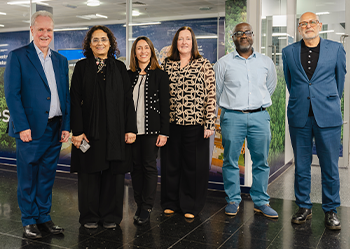University News Last updated 19 November 2024

A new state-of-the-art facility created by Birmingham City University (BCU) will give students unprecedented access to the latest technological advancements in housing to widen their skillset and make them more attractive to future employers.
“We’re educating the policy makers, housing experts, and construction consultants of the future,” said building expert Mike Leonard, a co-founder of BCU's Centre for Future Homes.
“It’s essential our students gain first-hand experience to drive the industry forwards.
“This facility provides the perfect test bed to immerse themselves in the latest technology – and it will give BCU’s students the edge that employers are looking for.”
BCU’s Centre for Future Homes is behind the new showroom, which is located in Millennium Point and was made possible by funding from the UKRI’s Regional Innovation Fund.
It features a range of all-electric heat solutions, including heat pumps, hot water storage, panel radiators, PV, and underfloor heating, as well as ventilation options to help the more air-tight homes breathe, and walling fabric options to increase thermal insulation.
"We’re thrilled to have a new research and education hub to showcase technologies that will be used in future homes,” said Dr Monica Mateo-Garcia, Centre co-founder and academic lead.
“It’s an essential space for research collaborations and professional development training to upskill students and industry,” added Dr Mateo-Garcia, BCU built environment expert.
Climate change and building safety are the key drivers for the Centre, which launched in 2021 and is leading the transition to net zero homes.
BCU academics continue to support housing developers in a number of ways.
From helping them to deliver low-carbon new-build homes that adhere to the government’s incoming Future Homes Standard to retrofitting 26 million existing homes and developing cost-effective ways to meet the government’s target of 1.5million new homes by 2030.
The Centre’s new facility will also play a key role in developing a future-ready workforce by providing training to upskill students, practitioners, and contractors.
It’s a flagship initiative for BCU that encapsulates its newly launched 2030 strategy – to carry out research that solves problems for a more inclusive society and boost regional growth.
Professor Hanifa Shah, Pro Vice-Chancellor STEAM and Executive Dean of the Faculty of Computing, Engineering and the Built Environment at BCU, said: “The Centre exemplifies the spirit of our new strategy – creating knowledge for good and producing future-ready graduates.
“By collaborating with industry, our staff and students carry out applied research that benefits the region and our communities, and helps us influence policy. Long may this continue.”
The Centre for Future Homes puts customers at the heart of the journey, rebuilding the public’s trust and confidence in the construction sector by putting quality and safety first.
Professor Harris Beider, Pro Vice-Chancellor Engagement, Enterprise and Innovation at BCU, explained: “As an anchor institution in the city, it’s essential that we engage with our local communities whilst providing radical solutions that get traction in terms of changing policy.
“Working with the housing industry, we’re finding innovative ways to create safe, affordable, and good quality low-carbon homes that will make huge difference for people in Birmingham.”
In partnership with Midland Heart Housing and Keepmoat, the Centre has supported two low-carbon new build sites that meet the government’s incoming Future Homes Standard.
“Our top priority is to make sure residents are safe, happy and healthy,” said Leonard, who is a visiting professor at BCU and CEO of Building Alliance, a community interest company.
“Once constructed, the way homes are lived in effect their performance,” he added. “We're using sensors to measure power used by appliances, temperature, and indoor air quality.
“This data is complemented by interviews with residents to understand how they operate their homes and identify opportunities to achieve optimum efficiency.”
These insights will enable policymakers to make evidence-based decisions for a safe transition to low-carbon living that avoids tragic consequences in the wake of the Grenfell Tower Inquiry.
Find out more about the Centre for Future Homes and ongoing projects.